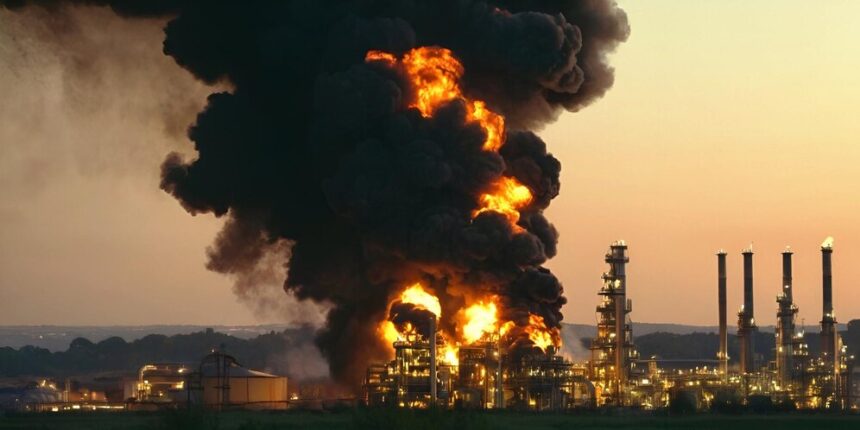Plant and refinery explosions are among the most devastating industrial accidents, causing widespread destruction and life-altering injuries. These incidents often occur without warning, leaving workers and nearby individuals with little time to react. The impact of such explosions can be catastrophic, resulting in severe physical trauma, long-term health complications, and emotional distress. Understanding the common injuries associated with these accidents is crucial for raising awareness and improving safety protocols.
While explosions may vary in scale and cause, the injuries they inflict share common characteristics. From burns to traumatic brain injuries, these injuries often require extensive medical treatment and lengthy recovery periods. Victims are frequently left with permanent disabilities that affect their ability to work and live normal lives. Preventing these tragedies starts with better safety measures, regular equipment maintenance, and training to minimize risks.
Severe Burn Injuries
One of the most common and devastating injuries sustained in plant and refinery explosions is severe burns. Depending on the intensity of the explosion, victims may suffer first-, second-, or third-degree burns. These injuries can result in permanent scarring, nerve damage, and serious infections if not treated promptly. Third-degree burns, in particular, often require skin grafts and long-term rehabilitation.
Burns are not only physically painful but can also lead to psychological trauma. Victims may experience anxiety, depression, and post-traumatic stress disorder (PTSD) as they recover. Proper medical treatment and emotional support are essential for helping burn survivors heal and regain their quality of life. Early intervention and access to specialized care can make a significant difference in recovery outcomes.
Traumatic Brain Injuries (TBI)
Explosions often generate powerful shockwaves, causing traumatic brain injuries (TBI) in those nearby. TBIs can range from mild concussions to severe brain damage, with symptoms that include headaches, dizziness, memory loss, and difficulty concentrating. In extreme cases, victims may experience long-term cognitive impairments or physical disabilities.
The force of the blast can also lead to direct impact injuries, such as when a victim is thrown into a wall or struck by debris. These injuries are life-altering and often require ongoing medical treatment and rehabilitation. Recognizing the signs of TBI early is critical for preventing further complications and improving recovery outcomes.
Crush Injuries and Fractures
Explosions frequently cause structural collapses, resulting in crush injuries and fractures. Workers trapped under heavy debris can suffer broken bones, internal organ damage, and loss of limb function. Crush injuries are particularly dangerous due to the risk of compartment syndrome, a condition that causes severe swelling and can lead to permanent muscle and nerve damage.
Multiple fractures are common in explosion victims, requiring surgeries and extensive rehabilitation. Recovery can take months, and in some cases, victims may never regain full mobility. For those with life-changing injuries, legal representation may be necessary to secure compensation for ongoing medical care and lost wages. Consulting a Fredericksburg plant and refinery explosion attorney can help victims navigate the complex legal process and hold responsible parties accountable.
Respiratory Injuries and Toxic Exposure
In addition to the physical trauma caused by the blast, victims are often exposed to toxic chemicals and smoke during plant and refinery explosions. Inhalation of hazardous substances can lead to serious respiratory conditions such as chemical pneumonitis, chronic bronchitis, or lung damage. Victims may experience symptoms such as coughing, shortness of breath, and chest pain that persist long after the initial incident.
Chronic respiratory conditions can significantly reduce a victim’s quality of life. Those who suffer long-term effects may require ongoing medical treatment and face permanent health complications. Proper respiratory protection and early medical intervention are crucial for reducing the severity of these injuries.
Hearing Loss and Vision Impairment
The intense pressure waves generated during an explosion can cause significant damage to a person’s hearing and vision. Many victims suffer from ruptured eardrums, leading to partial or total hearing loss. In some cases, this damage can be permanent. Exposure to bright flashes or flying debris can also cause serious eye injuries, including retinal damage and corneal lacerations.
For victims who experience hearing or vision impairment, these injuries can have a profound impact on daily life. Adapting to these changes often requires specialized therapy and assistive technology. Early diagnosis and appropriate treatment are critical for preserving as much sensory function as possible.
Psychological Trauma and Emotional Impact
The psychological toll of surviving a plant or refinery explosion is often overlooked but just as serious as physical injuries. Victims may develop post-traumatic stress disorder (PTSD), anxiety, and depression following the incident. The fear and emotional distress caused by such a traumatic event can affect relationships, work performance, and overall mental health.
Counseling and therapy are essential for helping victims cope with these challenges. Support groups and peer networks can also play an important role in the healing process. Addressing psychological trauma early is key to ensuring long-term emotional well-being.
Long-Term Disabilities and Life Adjustments
For many survivors of plant and refinery explosions, recovery is a lifelong journey. Serious injuries such as limb loss, spinal cord damage, or traumatic brain injuries often result in permanent disabilities. These injuries may require ongoing medical care, physical therapy, and adaptive devices to maintain mobility and independence. Victims may need to make significant adjustments to their daily routines, careers, and living environments to accommodate their new reality.
In addition to physical challenges, living with a disability can take an emotional toll. Feelings of isolation and frustration are common, especially for those who were once highly active in their professions. Support from family, counseling services, and community organizations can help victims rebuild their lives. Access to adequate resources and long-term financial support is essential for improving quality of life.
The Importance of Legal Support for Victims
Victims of plant and refinery explosions face a complex recovery process that involves medical treatments, emotional healing, and financial challenges. Seeking legal support can help victims hold negligent parties accountable and secure compensation for their losses. Responsible parties may include employers, equipment manufacturers, or third-party contractors who failed to maintain safety standards.
Compensation can cover medical expenses, lost wages, rehabilitation, and emotional distress. An experienced attorney will investigate the circumstances of the explosion, gather evidence, and advocate for the victim’s rights. Legal action not only provides financial relief but also encourages better safety practices to prevent future incidents.










 /home/u448362301/domains/theexpotab.com/public_html/wp-content/themes/foxiz/templates/popup.php on line 167
/home/u448362301/domains/theexpotab.com/public_html/wp-content/themes/foxiz/templates/popup.php on line 167